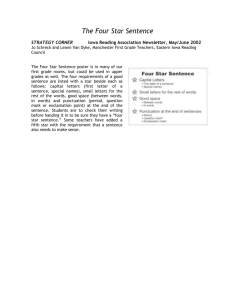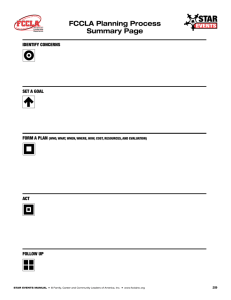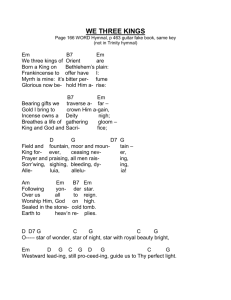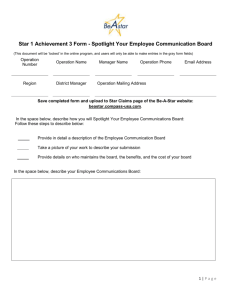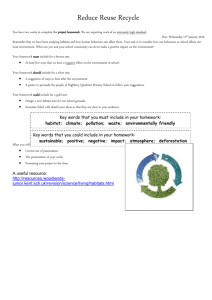View Word Document
advertisement
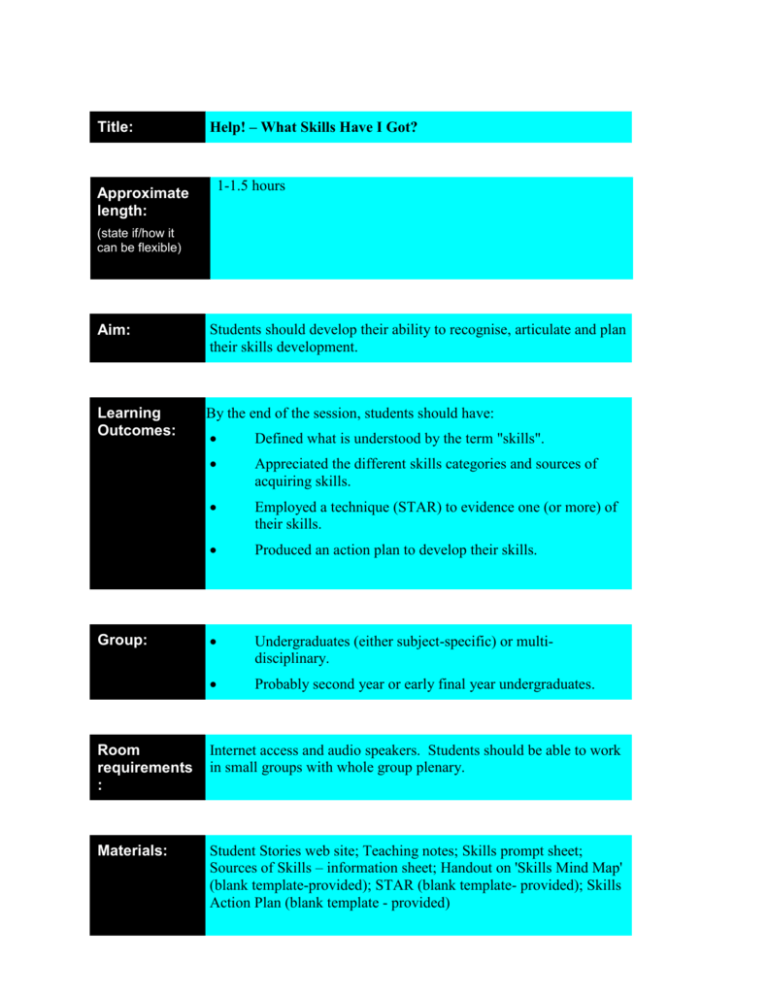
Title: Help! – What Skills Have I Got? 1-1.5 hours Approximate length: (state if/how it can be flexible) Aim: Students should develop their ability to recognise, articulate and plan their skills development. Learning Outcomes: By the end of the session, students should have: Group: Defined what is understood by the term "skills". Appreciated the different skills categories and sources of acquiring skills. Employed a technique (STAR) to evidence one (or more) of their skills. Produced an action plan to develop their skills. Undergraduates (either subject-specific) or multidisciplinary. Probably second year or early final year undergraduates. Room requirements : Internet access and audio speakers. Students should be able to work in small groups with whole group plenary. Materials: Student Stories web site; Teaching notes; Skills prompt sheet; Sources of Skills – information sheet; Handout on 'Skills Mind Map' (blank template-provided); STAR (blank template- provided); Skills Action Plan (blank template - provided) The Session Introduction: Ask the group to spend five minutes talking to the person next to them to come up with a definition of the term "skill". Short plenary asking for people to share their definitions. Share the definition of "Skill" (provided). Introduce the concept of different skills categories. Briefly outline the rest of the session: Listen to Student Stories clip of why it is important to know how to recognise and articulate skills; Students will develop their own mind-map of their skills plus the source of acquiring them; The importance of evidencing skills and a introducing a technique to help them do this; Developing an action plan to develop skills. Activity 1: Mind Mapping My Skills (give each Activity a title) Danuja, an Engineering student from Sri Lanka talks about how a job, volunteering and other recreational activities has developed his leadership and interpersonal skills http://www.studentstories.co.uk/audio/details.php?id=616 Using the Mind Map template provided, ask students to spend 10 minutes mapping their skills plus the source of acquiring those skills. Provide students with prompt sheets/information to assist (e.g. online through Prospects, professional society web resource, Sector Skills Council or skills prompt sheet (provided). Ask the group to pair and share their mind map with the person next to them. Short plenary to ask the whole group to feedback how they found the exercise. Activity 2: Where's the evidence? Introduce the importance of being able to evidence your skills in the labour market. Share two examples of good and poor practice, using the example of an internship placement (provided) - one using the STAR method, one example with no context and supporting information. Jasmine explains how her part time job in a call centre enhanced her communication skills and ability to take on responsibility, which she feels will help her get a job after graduation. http://www.studentstories.co.uk/audio/details.php?id=543 By completing the STAR proforma, ask each group member to show how Jasmine could evidence her skills. Short plenary to ask the group for a few examples of how they have applied the STAR method to their skills example(s). Using the STAR sheet, ask each group member to spend 10 minutes evidencing one (or more) of their skills from their mind map. Short plenary to ask the group for a few examples of how they have applied the STAR method to their skills example(s). Activity 3: (number of Activities will vary for each session) How do I know what skills are relevant & how can I develop them? Begin by outlining the importance of researching what skills are required for career sectors/occupations. Distribute handout of places to check out their understanding and knowledge (provided). Ask the group to write their own individual action plan (using the template provided); listing a minimum of three things they will do as a result of this session (including timeframes). Short plenary to ask group members to share with the whole group their action plan (This may be optional or they may want to share their plan with a fellow group member only, depending on the group dynamics). Conclusions: Skills can be gained and developed from a variety of different sources. It is important to think widely (e.g. Studies, work experience, voluntary experience, hobbies and interests). A technique such as STAR can help you to evidence your skills claims. - mention examples of the typical interview/application form questions they will face. Check out your understanding of what skills are required from a reliable source. The Careers Service is there to help further. Bibliography: Windmills Ltd (2009) – Windmills Skills Cards http://www.windmillsonline.co.uk/prods_skillscards.html Kolb, D. A. (1984) Experiential Learning, Englewood Cliffs, NJ.: Prentice Hall http://www.infed.org/biblio/b-explrn.htm The Higher Education Agency http://www.ukcle.ac.uk/resources/personal-developmentplanning/table/ - Personal development planning Resources: Mind map template: Skills prompt sheet: STAR template: Action plan template: Sources of skills information – handout sheet Optional Extension Activities Related Resources (including) Student Stories clips: Lynn describes how her study skills have developed unrecognisably over her three years at university, particularly in the areas of reading and note taking. http://www.studentstories.co.uk/audio/details.php?id=338 HEA (2010) - Student Employability Profiles http://www.heacademy.ac.uk/ourwork/teachingandlearning/employ ability/employability?tabIndex=0&#tab1 Further reading: Hawkins. P and Winter, J. (1995) Skills for Graduates in the 21st Century, Cambridge, Association of Graduate Recruiters. Kumar, A. (2007) Personal, Academic & Career Development in Higher Education, London, Routledge. Assignments /assessment activities: 1. Write a 500 word reflective piece on how the knowledge you have gained in this session will assist your ability to articulate and develop your skills. You may wish to include examples of how you would use evidence of your skills in the stages of the application process (e.g. CV, covering letter, interview). 2. From a sample job advertisement, write a CV and covering letter, articulate the skills required for the post and explain how you would demonstrate that you meet these requirements. Follow-on Topics may include: session: Researching how the Labour Market might change in the next 5-10 years for a career sector of interest. Develop an action plan which would enable you to position yourself to respond to these changes. My Skills Mind Map Skill: Source: Skill: Skill: Source: Source: Skill: Source: Skill: ME Source: Skill: Skill: Source Source: Skill: Skill: Source: Source: Skill: Source: STAR – Evidencing My Skills For each of the skills listed in your mind map, provide evidence of them by filling out the table below. This will help you when it comes to compiling your CV or covering letter, and help you talk more knowledgeably at interview, as employers will want to see evidence for the claims that you make. Situation Place your example in context and explain why action was required Task Outline what needed to be achieved. Action Explain what you did and your role Result Explain the outcomes of your action, quantifying the result wherever possible. Analysis Modelling IT Problem solving Project implementation Appropriate use of laboratory and workshop equipment Design Poor Average Subject Specific Skills Good SKILLS AUDIT GRID Academic Study Work Experience Extra-Curricular Activity Poor Average Personal and Professional Skills: Good SKILLS AUDIT GRID Academic Study Work Experience Extra-Curricular Activity Personal organisation Communication: Written Oral Negotiation Interpersonal Team working Leadership Decision making Using initiative Adaptability Examples of how you might develop the above personal skills are provided on the next sheet. EXAMPLES OF HOW YOU MIGHT DEVELOP SKILLS PERSONAL ORGANISATION COMMUNICATION INTERPERSONAL TEAMWORKING Setting priorities for academic work Meeting course deadlines Organising the activities of others in a Student Society Arranging fixture lists for a Sports Team Organising social/charity events Work Experience Writing for Public Impact Publicity for a Student Society Writing letters to raise sponsorship Member of Staff/Student Committee Work Experience Placement (e.g. SEED) Producing essays/dissertation Producing reports Student Union activity Member of Staff/Student Committee Hall Representative Community Action activities Nightline Sharing a flat – successfully Work Experience Membership of student committees Duke of Edinburgh Award Scheme Team sports Contributing effectively to group projects on your course Membership of orchestra/choir/band Work Experience LEADERSHIP DECISION MAKING USING INITIATIVE ADAPTABILITY Organising the activities of others in a Student Society Taking responsibility for the activities of others during work experience Community Action activities Captain of a sports team Motivating others to contribute to a group activity Researching information Module choice to meet individual needs/ambitions Choosing between vacation work options to support career plans/ambitions Choosing between accommodation options that accord with financial constraints and personal wishes Finding vacation work Starting up a new group or society or resurrecting an old one Gaining sponsorship for your course Overcoming obstacles to achieve a goal e.g. Duke of Edinburgh Award Scheme Generating ideas in a group activity Producing publicity material for a student activity Adapting quickly and successfully to changing circumstances in a vacation job Composing music My Skills Action Plan Skills Objective Action Required (include the key steps & people) By When Result Where Can I Check Out What Skills Are Required? There are numerous reliable sources that you can use to help you establish what skills you need for your chosen career area. Some of these are listed below: www.Prospects.ac.uk - Graduate Careers Website – provides useful information on the skills required for different occupational areas and job roles. http://www.sscalliance.org/SSCs/LinkstoSSCs.aspx Sector Skills Councils for different employment sectors. Sector Skills Councils are employer-driven organisations that articulate the voice of employers on skills issues. Professional Societies – most have careers-related material and contact information, where you can talk to specialist advisers. Speak to Academics or Employers direct – many of these will be happy to offer advice if you approach them in the right way. Don’t forget your University Careers Service – they will have a wealth of knowledge, experience and contacts to help you check your understanding. Teaching Resource Definition of “Skill” an ability that has been acquired by training ability to produce solutions in some problem domain; "the skill of a well-trained boxer"; "the sweet science of pugilism" wordnetweb.princeton.edu/perl/webwn A skill is the learned capacity to carry out pre-determined results often with the minimum outlay of time, energy, or both. Skills can often be divided into domain-general and domainspecific skills. ... en.wikipedia.org/wiki/Skill capacity to do something well; technique, ability. Skills are usually acquired or learned, as opposed to abilities, which are often thought of as innate en.wiktionary.org/wiki/skill The Different Types of Skills If there's one word in a resume that every prospective employee looks for and every applicant mentions, it is 'Skills'. There are different types of skills which can be broadly classified into the following categories: Foundation Skills: These skills are a must for any employee. They are classified as Basic, People, Thinking and Personal Qualities. They all fall into the following two categories. Marketable Skills: These are skills which are useful to your employer. They include All the different types of skills mentioned in the foundation skill set above. All the skills that the employer has specified in the advertisement for the job. Transferable Skills: These are the skills that are useful in more than one kind of job. The more you develop these, the more are your chances in the job market. An employer might be attracted to your profile even if he has no immediate use for your extra skills, if he foresees any use for them in the future. The most common skill in this category is computer literacy. Armed with this, one can be a typist, a helper in a store, a document writer and a variety of other things. Motivated Skills: There is a saying that goes like this 'Find a job you love and you will never have to work a single day'. This is what motivated skills are all about. Things that you want to do .not things you have to do. Adapted from: http://www.cvtips.com/career-success/know-the-different-types-of-skills.html Example of a good STAR Answer Situation: During my internship last summer, I was responsible for managing various events. Task: I noticed that attendance at these events had dropped by 30% over the past 3 years and wanted to do something to improve these numbers. Action: I designed a new promotional packet to go out to the local community businesses. I also included a rating sheet to collect feedback on our events and organized internal round table discussions to raise awareness of the issue with our employees. Result: We utilized some of the wonderful ideas we received from the community, made our internal systems more efficient and visible and raised attendance by 18% the first year. A poor example of skills articulation: During my summer internship, I was responsible for managing various events, which included promotion to local businesses, and produced a promotional packet.
